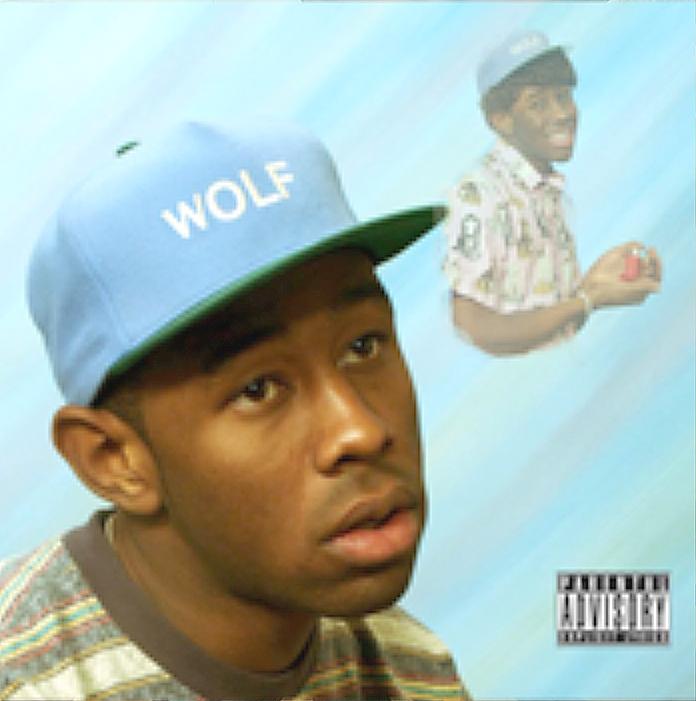Odd Future burst onto the scene in 2010 with an enigmatic sense of wonder. A gang of hip-hop skate punks that weren’t afraid to peddle in immaturity or blasphemous lyricism, Odd Future quickly became one of the most talked about acts on the blogosphere. A couple of groundbreaking mix tapes later and Tyler, The Creator, and his crew were winning MTV Awards and taking over late-night television.
Now that the group’s prolific wunderkind Earl Sweatshirt is back from his highly publicized escape to the Samoas, many felt the group was about to begin its second wind. Sweatshirt released a dark and deeply personal track, “Chum,” toward the end of 2012 and many people speculated this was the beginning of a mature Odd Future.
They were wrong.
Wolf is the highly anticipated sophomore full length from the group’s figurehead, Tyler, The Creator. The album opens with a jazzy title track, which in the first few seconds, sounds like a gorgeous breath of fresh air from this young rapper, reverb washed vocals fade in and the track takes an elegant build. Then 30 seconds in Tyler spouts out the beginning of a long string of senseless curses and homophobic slurs that comprises the majority of this album. It feels like a lost opportunity for true artistic growth, while the production has become far crisper and dynamic, one can’t help but feel a bit let down with the lyrical content on Wolf.
While Tyler treads upon hard topics such as depression, anxiety and his absent father in tracks like “Jamba” and “Answer,” the majority of the album is filled with the same mindless violence and immaturity that propelled the group to fame. Tracks, like “Colossus,” feel whiny and rundown, it’s a modern-day “Stan” that is comprised of Tyler complaining about all of the “fags” that he’s connected with through his music. We get it, you’re tired of people telling you how much they liked “Yonkers,” and yes some of your fans probably haven’t heard your first mix tape. However, complaining about the die-hard fans that propelled you to fame comes off as nothing more than condescending rather than shocking.
At the core that’s what Tyler seems to be shooting for with this album, shock and awe. He achieves it in droves. “Pigs” is a track that takes a first person perspective of a school shooting, and while some of the points are astute most of it feels like a sick fantasy being played out. Really though, that defines most of this album. There are some powerful images and lyrics peppered throughout the album, but they’re tucked between the dark thoughts of a depressed young male trying to cope with all of the fame that has so suddenly been thrust upon him.
Some of it can be truly heartbreaking though, “IFHY” begins with a spoken-word intro that claims “This isn’t a song, I just happen to rhyme when I get emo and find time to write facts.” These are the moments where you can remember what drew you to this spastic young artist. He proclaims that he’s “bad at keeping [his] emotions bubbled,” and it’s incredibly evident on this album.
When Tyler drops the façade of an emotionless punk who doesn’t care about the outside world, the listener can truly connect with him as an artist. “Answer” touches upon how even though Tyler despises his father, he’d love to just be able to hear his voice on the telephone. “Rusty” sees Tyler addressing his fan’s dissatisfaction with both his emotional side and his mindless violence, it’s a moment where one can suddenly realize the struggle this artist is going through. When your music contains such a strong juxtaposition in themes it’s easy to alienate fans that prefer one style to another. As Tyler raps about releasing recordings of his therapy sessions instead of studio recordings one can finally empathize with this directionless young artist. Album closer “Lone” features a deadpan account of the death of Tyler’s grandmother. As she lies weak in a hospital bed, Tyler struggles to make eye contact and the world gets a true, unfiltered glimpse into his psyche.
Ultimately Wolf is an album that feels like a natural progression for Tyler. Nobody’s expectations will be blown out of the water, and while the production has taken a clear step-up, the rest of the music has remained a bit static. However, this doesn’t necessarily mean it’s a bad album. Guest spots from Erykah Badu and Trash Talk make for an exciting bit of diversity and show that as his career continues to flourish, Tyler will gain more and more fans and detractors. Whether Tyler will grow as an artist or not is yet to be seen, however. Maybe he’ll stick to the same two-faced schizophrenic therapy sessions we’ve been given. Or maybe the leader of the Wolf Gang will finally bare his teeth and become the rap-game figurehead everyone at once believed he could be.








